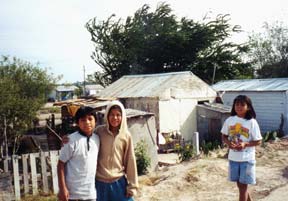A colonia is actually produced the same way most neighborhoods usually are: Take a plot of land and subdivide, subdivide, and subdivide again. Property owners can build as they wish.
This usually starts out as a collection of trailers or other types of temporary dwellings.
Over time, intensification happens. Soon enough, it is impossible to tell colonias apart from their township and hutment brethren.
But it doesn't stop there. Over time a colonia starts to look like a gecekondu, campamento, or favela--that is, it has become essentially identical in built form to a "formal" neighborhood. This is emergent urbanism, the purest manifestation of our community-building impulse.
That isn't to say they don't have problems, of course. Infrastructure provision is weak to nonexistent. The water is filthy, and illnesses spread like wildfire. More than a few commentators call colonias "third-world slums".
But that's the problem, isn't it? Slum is too general a word, and we confuse ourselves when we use it. There are two classes of slum problems--infrastructural problems and socioeconomic problems. We often assume all "slums" have both, and that all neighborhoods inhabited by the less well-off are "slums", and in so doing, not infrequently, offer exactly the wrong solutions for the problems at hand.
The real problem of mature informal settlements--like mature favelas, campamentos, gecekondular, or, yes, colonias--are not socioeconomic. Attaining maturity by definition means intensification, which implies adequate internal solutions to socioeconomic issues to maintain a positive economic trajectory. No, the real problems of such communities are infrastructural.
And to solve infrastructural issues--requires formalization. It requires that the community be recognized as a community and not derided as a slum. It requires, in short, that we stop assuming that every place that isn't as well-off as Suburban America is "poor", a "slum", and needs to be "cleared"--a bias inherent in certain advocacy organizations--
--and instead work to identify what causes socioeconomic problems, understand a community's socioeconomic trajectory, install physical and social infrastructure as needed, and allow the community to continue incremental progress.
See, here's the bulldozer problem, the bulldozer bias, the bulldozer fallacy: When you flatten a slum, you don't make the slum go away. You make it go somewhere else. But what you do make go away--are the solutions embedded within the slum. The bulldozers just make the problem worse.
Some* people, fortunately, understand. But they are the minority.
__________
*That said, "solid homes with garages and paved driveways"? Really?? That's your idea of incremental improvement? Can you be more biased???












No comments:
Post a Comment